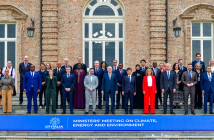- In 2023, Just Share and amaBhungane filed a series of access to information requests to try to establish the extent of corporate climate lobbying in South Africa. Read more
- The responses demonstrate that closed-door engagement between government officials and private business on climate policy is common practice.
- We also discovered a lamentable lack of record-keeping about these engagements.
International research has identified corporate climate lobbying in South Africa as a significant threat to effective national climate change policy. “Corporate climate lobbying” refers to efforts by the fossil fuel industry and its industry associations to delay and weaken government efforts to respond to the climate crisis, and to shape policy to suit their own interests instead of those of the broader public.
In 2023, in an effort to discover just how deep this lobbying goes, Just Share and amaBhungane submitted a series of access to information requests, in accordance with the Promotion of Access to Information Act (PAIA), asking government and industry stakeholders for details of any closed-door meetings between corporates or their representatives, and policymakers, relating to climate and energy policy.
The outcomes of our PAIA requests reveal not only that this lobbying is taking place, but also that there appears to be no attempt to record or preserve the nature or outcomes of these discussions. At best this is evidence of worrying levels of disorganisation. At worst, it represents a disturbing resistance to accountability and transparency on an issue of crucial public importance.
The PAIA requests
The right of access to information is protected in the Constitution, as is the right to an environment that is not harmful to health or well-being. Transparency about the extent to which industry players are meeting policymakers behind closed doors to stall or weaken climate-related policy, or to shape it to their advantage, is clearly in the public interest.
Our PAIA requests were sent to Sasol, South Africa’s biggest private carbon emitter and a key player in influencing government climate policy; three industry associations active in relation to energy policy: Business Unity SA (BUSA), the Minerals Council of South Africa, and the Energy Council of South Africa (ECSA); and to the departments of mineral resources and energy (DMRE), forestry, fisheries and the environment (DFFE), National Treasury and the Presidency.
The requests sought records relating to any government-industry engagements between 1 January 2021 and the date of response (about three years) on climate matters, including the agendas for and minutes of such meetings, and supporting documents such as follow-up letters, presentations and policy recommendations.
Our experience with the practicalities of the requests made it clear that the PAIA process is crying out for review if it is to be an effective, broad-based tool for realising the constitutional right of access to information.
We would not have obtained any information without the dogged work of lawyers acting on our behalf, repeatedly following up with both public and private entity information officers to remind them of legislative deadlines, and essentially hassling them into providing us with a response. Not one of the respondents provided the information requested within the initial 30-day timeframe specified in PAIA.
After months of follow-up letters, phone calls and emails, multiple requests for extensions, an accusation by the Minerals Council that we were undertaking a “fishing expedition”, and refusals to disclose specific documents, all parties eventually provided some information.
The holes in the records
The information that we did receive paints a picture of industry’s regular and ongoing solicitation of government on climate policy without the knowledge or inclusion of the public.
None of the parties appears to see anything concerning in this lack of transparency. For example, the Minerals Councils’ response stated that it “actively participates in engagements and consultation processes advocating for the mining industry positions in the development of South Africa’s policy and regulatory approach to climate change mitigation and adaptation”’, but at the same time that it is “not involved in any corporate lobbying activities”.
Equally concerning is the incompleteness of the records, and the lack of alignment in responses from government and industry about the same engagements.
Government departments appear to lack basic calendar records of when meetings took place and with whom. In many instances where government respondents acknowledged that meetings had taken place, they could provide no agendas or minutes of those meetings. The private entities also do not appear to keep accurate records.
BUSA sent us a list of 26 meetings held with various government stakeholders over the period of the request, but only 14 sets of minutes. Two of the sets were from meetings that were not on BUSA’s meeting list.
BUSA also provided some minutes of meetings held between BUSA and the DMRE, but either the DMRE did not have any records of those same meetings, or it chose not to disclose them.
Sasol provided us with a letter from its CEO, Fleetwood Grobler, to DFFE Minister Barbara Creecy, referring to a meeting held between DFFE and Sasol in June 2021, and sharing “further developments […] specifically relating to our hydrogen journey, as well as our air quality compliance and GHG reduction strategy”. It also states that “we have made good progress in establishing an Energy Council, in collaboration with several key players in the energy sector”. However, neither Sasol nor the DFFE referred to or provided any information relating to the June 2021 meeting.
The DFFE provided a list of attendees and minutes from various meetings with Sasol between June 2022 and September 2022, relating to air quality issues, but with the names of the parties redacted due to them being “commercially sensitive information”. Sasol did not refer to any of these meetings, despite its description of its conduct as “transparently engaging with regulators”.
The DMRE told us that it does not have any minutes of meetings on the issues requested other than the single document it provided, which was from a “Just Energy Transition Framework consultation with Sasol”. This document is useful, but it is hard to believe it represents the only engagement with the DMRE.
This is an extract from a main article for the amaBhungane Centre for Investigative Journalism. Read the rest of this exclusive story HERE
Authors: Caroline James and Emma Schuster













